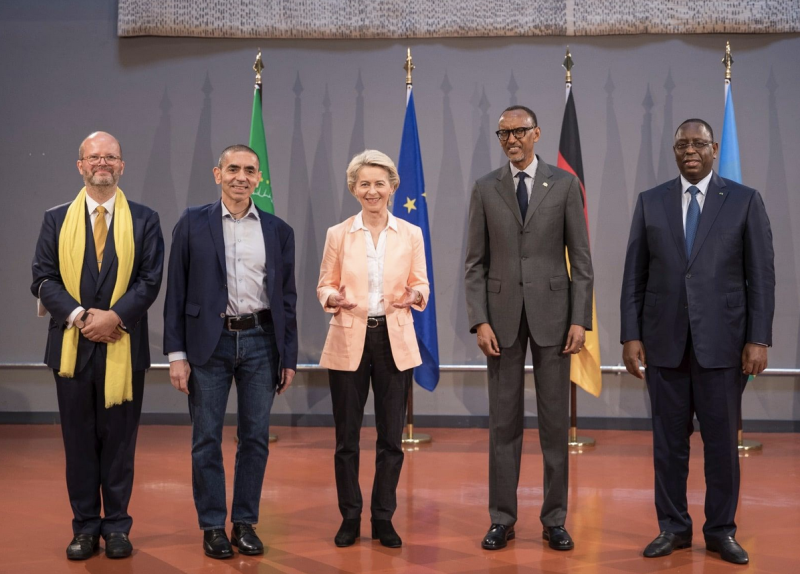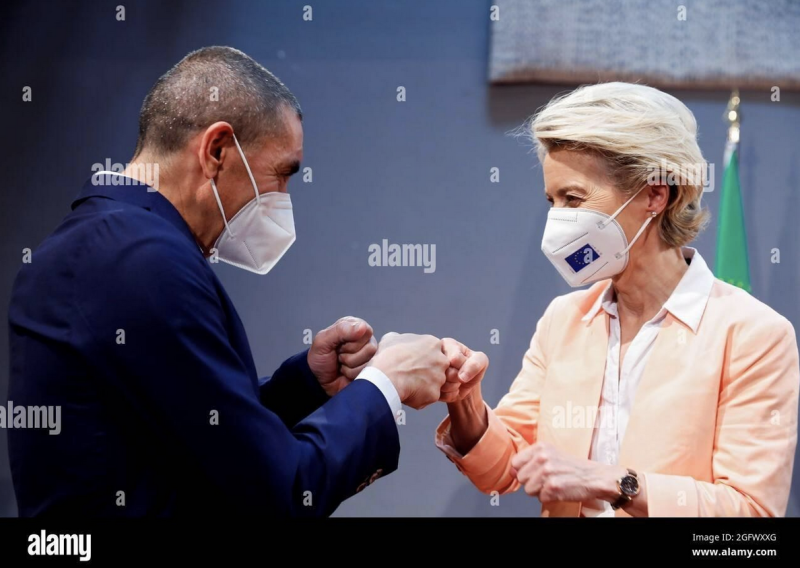
While Covid-19 vaccine critics are busy celebrating the fall of Pfizer’s share price and its legal troubles in the USA, the German company BioNTech, the actual legal manufacturer of the so-called “Pfizer vaccine” and the main financial beneficiary of its sales, is continuing its expansion with the full and open support of Germany and the EU. On Monday, EU Commission President Ursula von der Leyen, German Foreign Minister Annalena Baerbock, Rwandan President Paul Kagame, and BioNTech co-founders Ugur Sahin and Özlem Türeci gathered in the Rwandan capital of Kigali to celebrate the inauguration of BioNTech’s new African mRNA vaccine manufacturing site.
The gala event is documented in the below Reuters stream (or, in full, in the local RwandaTV stream here).
According to Germany’s dpa wire service, citing official sources, the German government has contributed €550 million euros to the project, €500 million coming from the development aid budget. It is not clear how much of this money is going to BioNTech and how much to related local beneficiaries. In any case, after having cleared over €30 billion in profits on sales of its Covid-19 vaccine in 2021 and 2022, BioNTech will surely not need much help.
It should be noted that the German government already subsidized the expansion of BioNTech’s manufacturing capacity in Europe by way of the €375 million grant it provided to the company in September 2020, before BioNTech’s Covid-19 vaccine candidate – its only product to date – had even won regulatory approval. Two days later, BioNTech announced that it was purchasing what would become its main European production facility: the Behringwerke in Marburg.
In addition to the €550 million from the German government, the European Commission has announced that the EU is contributing another €40 million to the project as a “Global Gateway investment.” “Local manufacturing of vaccines with mRNA technology, in Africa, for the African people, will be a game changer in the fight against diseases and pandemics,” Commission President von der Leyen is quoted as saying in the announcement. “The EU is proud to work with Rwanda and BioNTech to develop a vibrant biopharmaceutical industry on the continent.”
In his speech at the Kigali event, Rwandan President Kagame thanked von der Leyen for her “instrumental” role “in initiating the collaboration with BioNTech.”
Referring to BioNTech’s “BioNTainer” production units in her own speech, President von der Leyen remarked, “it is amazing to think that in just two years, these BioNTainers will be producing up to 50 million of [sic.] doses of vaccines per year.”
But here’s the rub. Fifty million doses of what vaccines? As just noted, the Covid-19 vaccine is BioNTech’s only product, and the Covid-19 pandemic is officially over. Alluding to the prior speech by BioNTech CEO Ugur Sahin, von der Leyen continued:
And we are not only speaking about battling the coronavirus. But it is about breaking new ground in the fight against, as you have said, Uğur, tuberculosis, malaria and potentially even cancer.
But there are not any authorized mRNA vaccines or drugs for the latter diseases, and millions of doses are not needed for clinical trials. The BioNTech Africa project grew out of a meeting which took place in Berlin in 2021. In addition to von der Leyen, Sahin, and Kagame, the participants also included Senegalese President Macky Sall and the then president of the European Investment Bank (EIB) Werner Hoyer (a former official of the German Ministry of Foreign Affairs). Hoyer, Sahin, von der Leyen, Kagame, and Sall are pictured from left to right in the below photo from Kagame’s Facebook post here.
The below agency photo of Sahin and von der Leyen cheerfully fist-bumping comes from the same event.
As recounted in my first ever Brownstone article on BioNTech here, the German government sponsored the very founding of BioNTech in 2008 as part of a “Go-Bio” funding program that was meant to make Germany into a world leader in biotechnologies.
Ursula von der Leyen was a member of the German government that made those initial “Go-Bio” grants to Sahin and his collaborators, and she was a member of all the successive German governments that continued subsidizing BioNTech during all the many years when the firm only ever lost money prior to Covid.
SourceRelated posts:
Views: 0
 RSS Feed
RSS Feed

















 December 25th, 2023
December 25th, 2023  Awake Goy
Awake Goy 

 Posted in
Posted in  Tags:
Tags: 
















